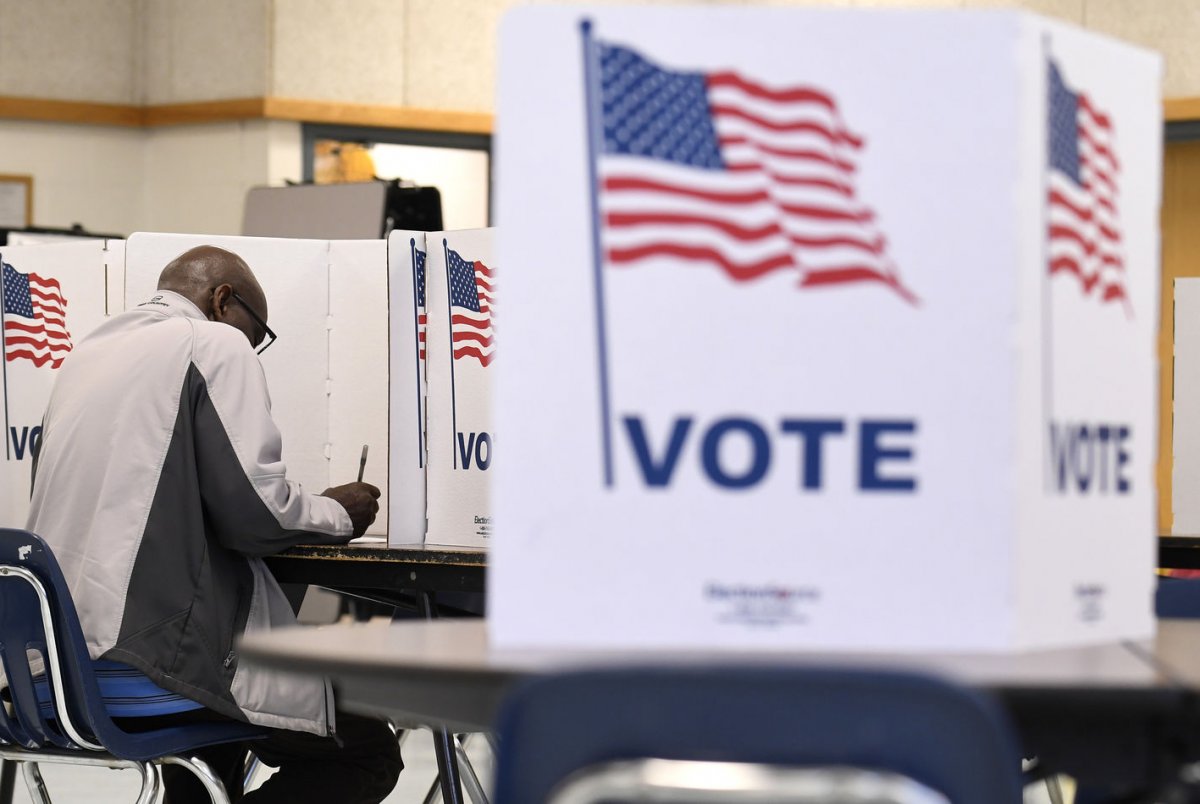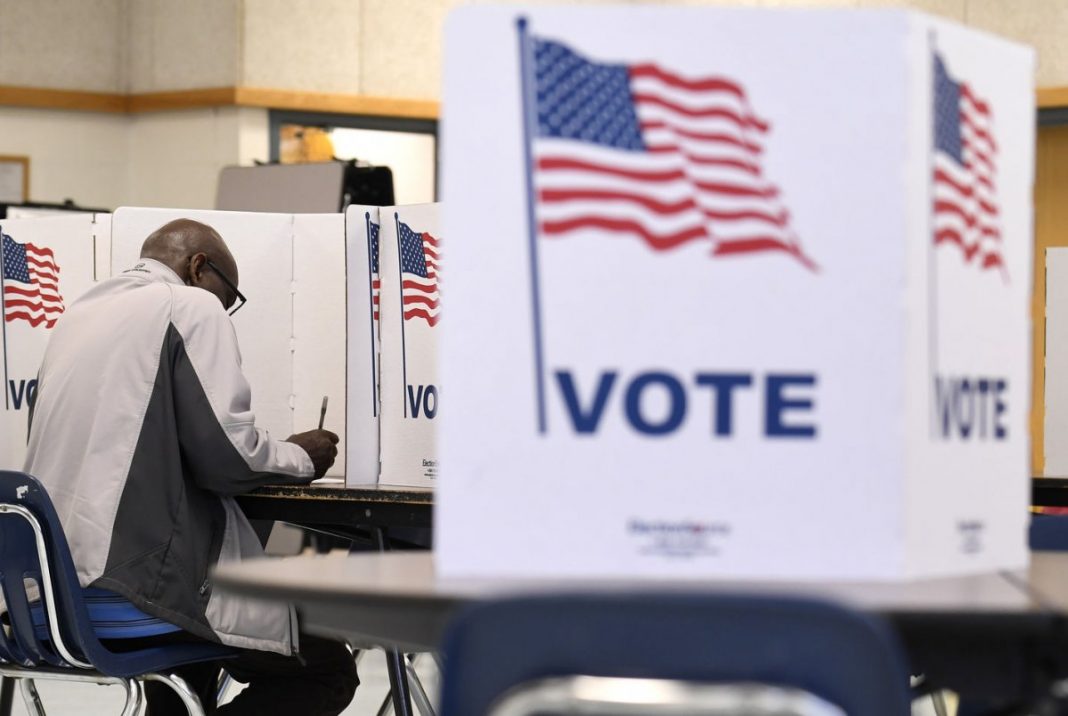
Oct. 25 (UPI) — Voters in 27 U.S. states will cast ballots during November’s midterms in the race for a position that could end up protecting the sanctity of future elections.
Republican secretary of state nominees in Arizona, Michigan, Minnesota, Nevada and other jurisdictions have questioned the legitimacy of the 2020 presidential election, placing a renewed importance on these races.
“Across different races and different states, there are hundreds of candidates who are acting as election deniers,” UCLA law professor Dr. Rick Hasen told UPI in an interview.
“There are lots of things someone in that position could do to mess with elections if they did not act with good faith. And either believing or saying you believe false claims about stolen 2020 elections means that you might not be counted on to administer the 2024 elections fairly.”
The secretary of state is, in most cases, also a state’s chief electoral officer. Duties vary somewhat, but management and oversight of elections and voter rolls is assigned to the secretary of state in 41 states. The position does not exist in Alaska, Hawaii or Utah.
In many cases, a secretary of state has the final call on certifying a state’s electoral votes in a presidential election. Some candidates have even campaigned on “decertifying” the 2020 results, which is not possible.
In Georgia, Brad Raffensperger became perhaps the most famous secretary of state in the country in 2020, when he refused to yield to Trump, who pressured him in a phone call to overturn the state’s presidential election results. That led to an investigation that is still ongoing, with former Trump personal lawyer Rudy Giuliani and Sen. Lindsey Graham, R-S.C., among those called to testify.
Raffensperger, a former state representative was shunned by his own party but managed to fend off a Trump-backed challenger to secure the Republican nomination in the battleground state. He’ll face Democratic state Rep. Bee Nguyen in November.
Having so-called election deniers take office as secretary of state “creates conditions for undermining the electoral process and ultimately, American democracy,” said Hasen, who also heads up UCLA’s Safeguarding Democracy Project.
“I’ve never been more worried about American democracy than I have been in the last few years. I think that the potential for a stolen election in the United States has risen considerably and that that change is attributable to the false claims spread by Donald Trump and others that the 2020 election was stolen.”
State lawmaker Mark Finchem has denied the 2020 election results, making the topic part of his campaign for Arizona’s secretary of state office. Finchem, who has forged close ties with Trump, has said he would not have certified the election results.
Finchem has said he would “support law enforcement, clean the voter rolls for accuracy, prosecute fraud, secure [Arizona] elections, increase transparency, communicate with voters, and count all legal votes.”
Earlier this month Rep. Liz Cheney, R-Wyo., publicly urged voters to reject Finchem in the upcoming midterm election, as well as Republican gubernatorial candidate Kari Lake. Lake has called Joe Biden an illegitimate president.
Cheney has condemned Trump for his actions after the election and before the Jan. 6 attack at the U.S. Capitol. She is one of two Republicans on the House committee investigating the riots and has repeatedly said Trump should never be allowed to hold office again.
In Minnesota, attack ads against Republican secretary of state nominee Kim Crockett have used clips of her describing herself as “the election denier in chief.” Crockett has said her comments were taken out of context, but she does want to restrict the early voting period and see fewer people using absentee or mail-in voting. Crockett has claimed Trump won the 2020 election, which she called “rigged.”
More than $2.5 million worth of political advertising has been booked on Minnesota television so far, an unprecedented amount.
Former Nevada Republican state representative Jim Marchant also embraces the belief that Trump was victorious in the 2020 election. Marchant has campaigned on overhauling “the fraudulent election system in Nevada.” He has also insisted that a number of the state’s politicians “have been installed by the deep state cabal.”
Nevada’s current Republican secretary of state Barbara Cegavske does not subscribe to the election denial theory but is unable to run again because of term limits.
Retiring Rep. Adam Kinzinger, R-Ill., has endorsed Democratic secretary of state candidates in certain jurisdictions, drawing the ire of his party. Kinzinger, who voted to impeach Trump and joins Cheney on the Jan. 6 committee, rolled out a bipartisan list of endorsements, prioritizing people who are “going to be positions that, frankly, can be bulwarks to defend against a real constitutional crisis in 2024.”
“A badly-placed, bad faith secretary of state can really throw the whole country into chaos,” Kinzinger told Politico.
The race in Michigan is one of the others Kinzinger has thrown his money and notoriety behind. Community college instructor Kristina Karamo was part of an attempt to overturn the 2020 election results, which she called fraudulent and has the backing of the former president. The 37-year-old single mother has also embraced other conspiracy theories and unsubstantiated rhetoric. She’s part of the Save America coalition of Trump-backed secretary of state candidates on ballots across the country.
While voters directly elect a secretary of state in 35 states, the position is appointed by either the governor or the state legislature in another 12.
For example, Pennsylvania will not elect a secretary of state on Nov. 8. But, that doesn’t mean it’s immune from the effects of election denial. Quite the opposite actually.
The Keystone State, often a political battleground, leaves it to the governor to appoint the office. And it just so happens the race to replace the retiring Gov. Tom Wolf, D-Pa., is wide open.
“So in some states, with election deniers on the ballot, this has become an issue. In other states it’s a little bit more normal, there’s less focus on that race,” says Hasen.
“But we also have gubernatorial candidates who also embrace these false claims like Doug Mastriano in Pennsylvania, who will be in a position to appoint their state’s secretary of state as chief election officer.”
Mastriano, the Republican candidate backed by former President Donald Trump, is among the staunchest election deniers.
Some pundits wonder if the public is really noticing or digesting the importance of the looming elections, now two weeks away.
“Some of these candidates seem so partisan that maybe you shouldn’t trust that they would execute the laws in their state or would put more weight on the scale for a candidate of their own party,” Travis Ridout, a professor of political science at Washington State University told UPI in an interview.
“Usually the secretary of state position is a position that we don’t think much about. I think people are thinking about it this year, a bit more than in the past but still it’s not at the top of our thoughts by any means.”
Hansen also warned that the turbulent events of the 2020 election, which culminated with the Jan. 6 riots at the U.S. Capitol may not have spurred voters to place the necessary attention on these races.
“Some people are focused on this issue but many are not. For many people, Jan. 6 was an unpleasant isolated incident and they don’t see it in the larger context of the threat to American democracy,” said Hasen.
“And it’s not clear that either Democrats or Republicans really have the right electoral objectives to highlight these risks. Unfortunately, I think many members of the public are unaware or have been underestimating the serious risks to democracy that come from electing candidates who could potentially undermine the running of elections in the future.”
